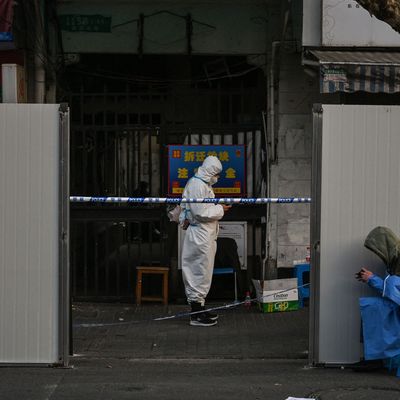
More than two years after COVID-19 first began circulating in Wuhan, major Chinese cities are once again locking down amid an Omicron surge. On the latest Pivot episode, Kara Swisher and Scott Galloway discuss what another round of supply-chain disruptions caused by COVID means for the future of American trade.
Kara Swisher: COVID is not done disrupting the global supply chain. Today, more than 50 million people are locked down in Shanghai and Shenzhen, China, home to some of the world’s largest ports. Shenzhen had 66 new cases of COVID on Sunday, and that prompted a lockdown. Apple’s supplier Foxconn shut down its operations at two of its largest factories in Shenzhen, and there are issues all over Hong Kong. Will the supply-chain disruptions like this speed up the adoption of robotics and manufacturing? Does Apple need to develop more ways to deal with this? Obviously, the global supply chain still continues to have its price.
Subscribe on:
Scott Galloway: The most profitable product in the history of the modern economy is the iPhone. It has the margins of a Ferrari with the production volumes of a Toyota. We’ve never seen that. We’ve never seen the highest-priced product be the market-share leader. And that is, to a certain extent, a joint venture of the Americans and the Chinese. And while we garner the majority of that shareholder value, China’s played a huge role in it. There are more employees of Apple in China than there are in the United States.
I believe in the last 50 years, the most important product, as it relates to geopolitical influence, are the vaccines. And we make better vaccines. They’re so complicated and intricate, and the supply chain has to be cold storage — that when Russia comes out with a vaccine and Argentina says, “Okay, we’re taking your vaccine,” and then a bunch of people still end up in the hospital (and the Chinese vaccine also isn’t as good), it says something very powerful around the world: that America, despite all our problems, is still the most innovative nation, still has the best-quality standard, still has the brightest minds. When shit gets real and you need something very important, you can trust Americans in America to make the best product. And this directly impacts what’s happening in China because the right approach early in the pandemic was a severe lockdown. And because of notions around personal freedom or misinformation or a lack of willingness to sacrifice, we didn’t adopt that. And I think China got a ride initially. What they did was harsh. It was brutal. But within a few months, people were spending time with their grandparents and going to concerts and going on dates.
This is entirely the wrong strategy right now. And they can’t adopt the same strategy as us because it is still a much bigger risk to them. You could still have more die from COVID-19 in China than here from this point forward because their vaccine is not as effective.
The thing I’ve noticed about this virus is everybody gets their turn at the woodshed. And to a certain extent, China hasn’t. And I wonder if that’s coming for China. And as it relates to supply chain for the last two years, every company I’m involved in has been thinking about a more heterogeneous supply chain: Let’s move some stuff out of China and Shenzhen.
K.S.: Hard, though, with this. All our phones come from there. They have concentrated in one place. And making the shift is expensive. It’s difficult. It might not be possible very quickly. So I think that’s the problem, is they’ve put all their faith in a global supply chain, really.
S.G.: Not even global. A Chinese supply chain.
I mean, I was on the board of a retailer, and we woke up one day and realized 97 percent of our tops came from not just China but one region in China. And when it got shut down, we had no tops. I think the big beneficiary here, just going out to a second-order effect, is going to be Mexico. My colleague at NYU, Pankaj Ghemawat, has done some great research. And as global as we are, trade is still a function of proximity. Typically, your trading partner is the one that’s on your border.
Our biggest trading partners are Canada and Mexico. And I think a lot of companies are going to decide to pay a little bit more and have a more approximate supply chain out of Mexico, which has lower costs and has a decent technology infrastructure. Mexico City is a fantastic city. The unit universities of Monterrey produce fantastic technologists. They attract capital. It’s a stable society. It’s a democratic society. They are no threat to us. We like them. They have been sending their human capital to us despite the fact we demonize them. We have a great relationship with Mexico.
K.S.: Former president Trump’s not going to like that.
This transcript has been edited for length and clarity.





























